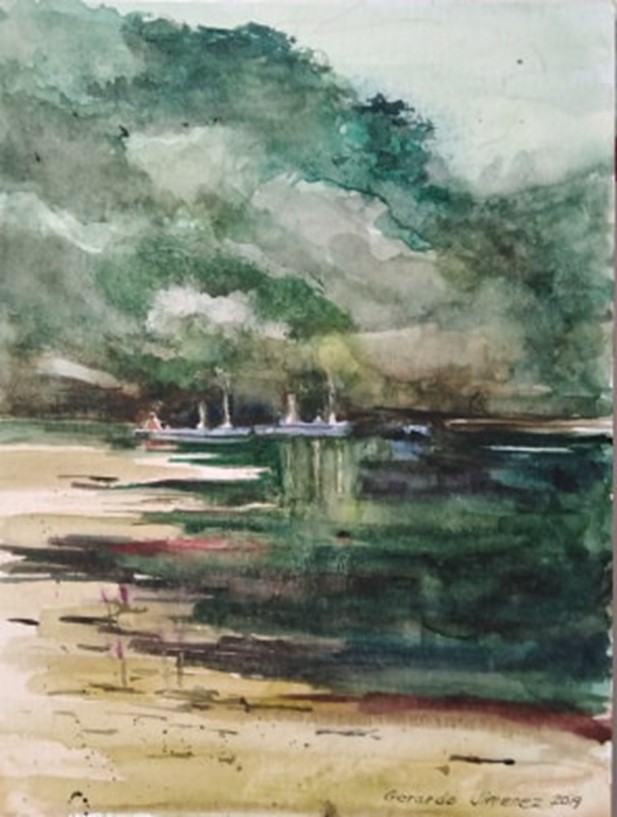IN A MEMORABLE TURN OF PHRASE that spoke volumes to me, Pope Francis spoke of “the saints next door” who have braved the risks of the coronavirus to serve others in need – thoughts that came from the heart during a homily without text delivered at a solemn service in a grand dome bereft of people due to the times.
For those of us now caught up in isolation that has been in place for nearly a month, it sometimes feels like almost half a lifetime. Particularly for the elderly who have been counseled not to venture out of their houses at all, it is a daunting experience to fend for one’s selves at this time. Unless, of course some kindly neighbor takes notice and decides to do a small act of kindness, or two.
Our Neighbor
We have a young neighbor from Kathmandu, Nepal, whom I have only recently known. Once or twice, he has knocked at our door, asking if we needed anything at all at this time, and later drops outside our door a bag of oranges and some bread which tasted like manna from heaven. I am sure that there are countless acts of kindness such as this taking place around our country, in cities and towns, in villages elsewhere.
In a sense, we have people around us who continue to help others, and have become “saints next door” – not perfect, indeed, but “sinners who keep on trying,” in the words of Nelson Mandela soon after his government dismantled Apartheid (the segregation policy that discriminated against the majority blacks in his country).
Who is my Neighbor?
Which brings me to an experience that I cannot forget while I was a student in Lima, Peru, during my studies there in the early 70s.
I then had a learned teacher whose name was Gustavo Gutierrez. He was a slight figure who walked with a slight limp but with authority and has since become a Dominican priest. In 1971, he wrote the landmark book, “A Theology of Liberation”, which spoke of “the preferential option for the poor” and for some time this strand of thinking was deemed suspect and “subversive”.
A central tenet of his writings on the subject revolved around the question: “Who is my neighbor, who is the neighbor that I have to love?”. He contends that the answer to this query can be found encapsulated in a story related in the Gospels as the parable of the Good Samaritan – a samaritan, by the way, in their culture then was considered a stranger.

A Stranger Who Goes Out of His Way
Fr. Gutierrez goes on to say that our neighbor is not only the person next to us, or kin to me like my family, my dear friends, my mates in school and at work, or, the people next door, but those who may cross our paths and those whom we approach or reach out to.
The Samaritan or the stranger was considered good precisely to “the extent that he went out of his way” to help the wounded man left for dead by the wayside, the man who was waylaid by robbers on the road and had no one to help him.
In this way, as far as I understood in the discussions we had in class, the neighbor does not always mean one who is near and dear to us, but the neighbor can be one who may initially be distant but who because of our effort to make an “approach” has been “made close”.
Besides, fast forward a few decades, because of the gains we have made in social media we may also have “made” new neighbors digitally or virtually. Because of the different layers of distancing imposed on our daily lives, we may in fact have become closer to those whom we may communicate with from a distance than those who are physically proximate. They too may have become our neighbors, or neighbors-to-us.
The Vulnerable in Our Midst
It may be easy, though not always and definitely not all the time, to help those close to us, but the question remains: how about those who are distant and far from us, in the “peripheries” of our lives, so to speak?
In this time of physical distancing, it is important to note as the sociologist Prof Randy David reminds us that there is a world of a difference between the distancing that is physical and one that is social, the latter one being a choice that we can ill-afford in deeply-divided societies.
In our country today, where poverty and inequality abound, we can reiterate the question: “who is my neighbor?” And, there are countless people who are vulnerable precisely because they are left behind, abandoned, maltreated and in need.
What has changed out there during this pandemic period is the world as we knew it; but more so, the way we see things.
What has changed far more radically (perhaps, because solitude engenders reflection) is the world within us, our perspectives, the way we value what truly matters and the way we judge what is truly important in our lives.
